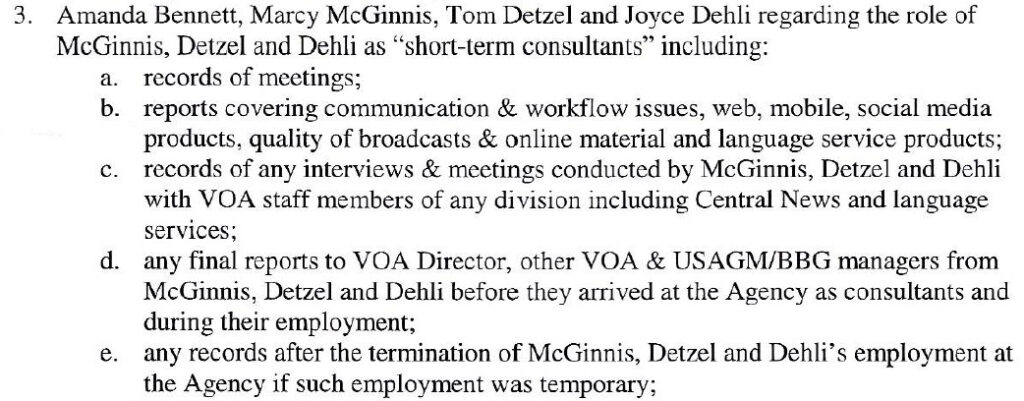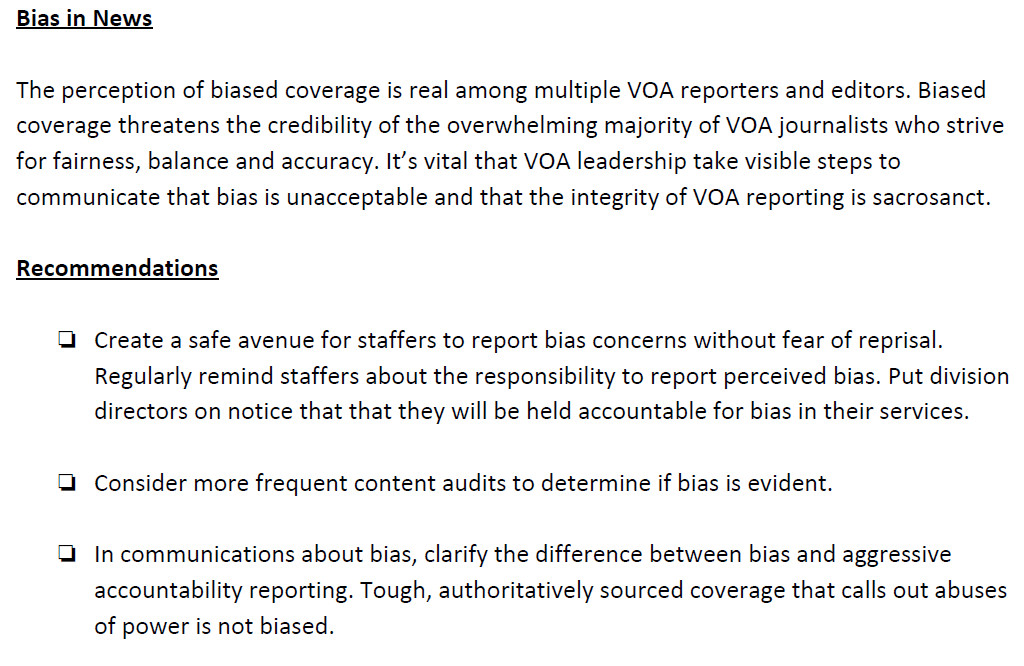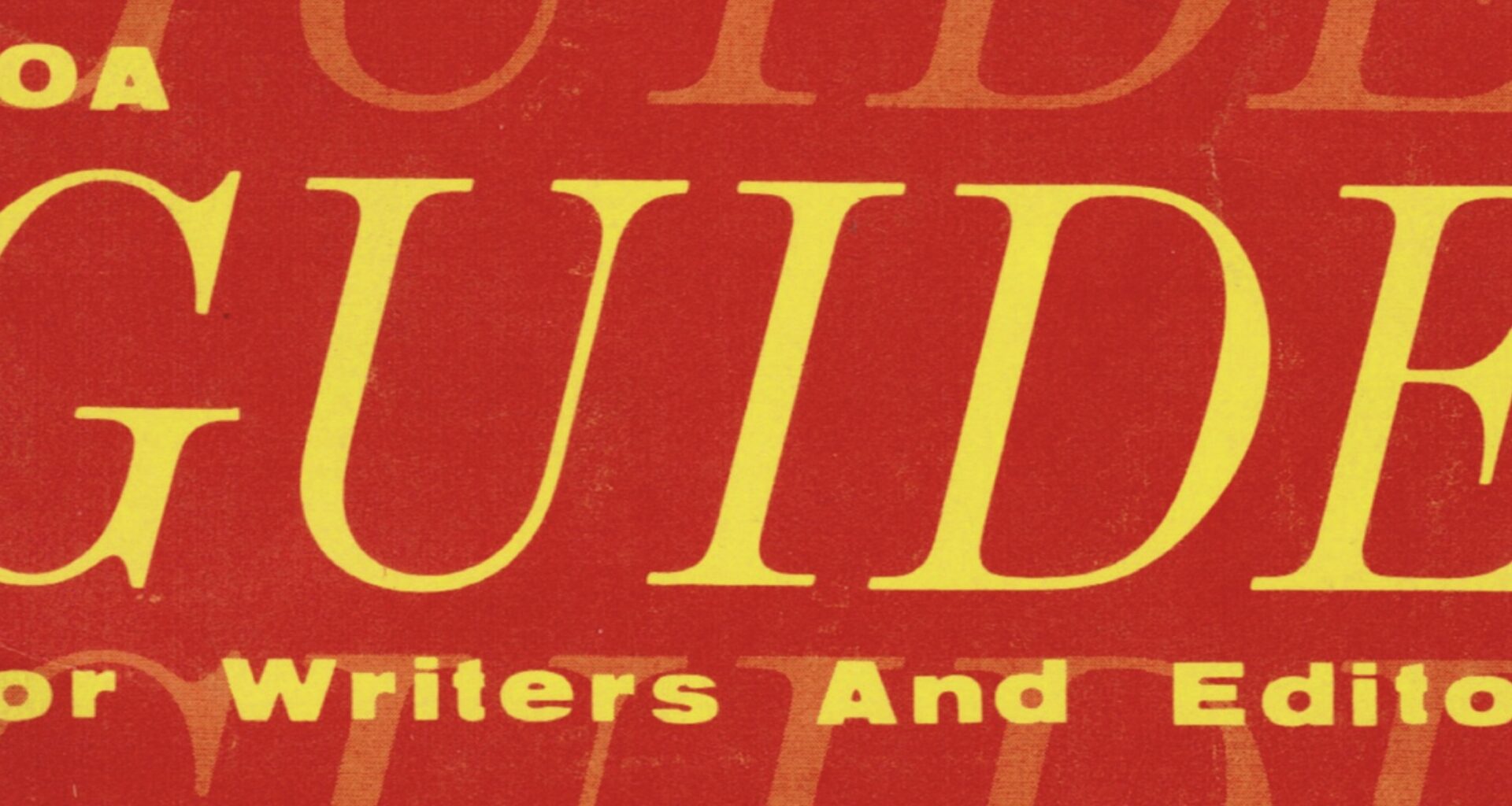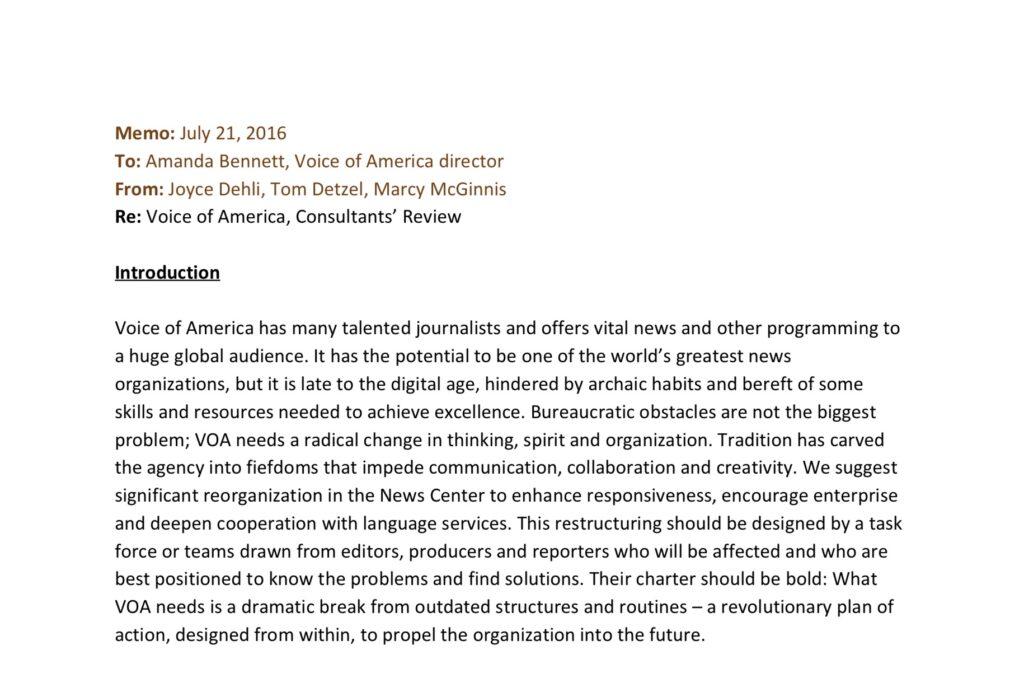OPINION
Trump USAGM CEO Michael Pack Was Attacked For Attempts to Focus on Problem
by Dan Robinson
It was May of 2016 and Amanda Bennett was only a few weeks into what would become a nearly four year stint as director of the Voice of America, among the “plum” jobs in Washington, D.C.
Bennett was just getting her feet wet, and at the time was dependent on a group of longtime embedded VOA managers that she would at one point describe as a “fantastic leadership team.”
She had received fair warning, from former VOA employees and extensive reporting by the independent watchdog website BBG and USAGM Watch, of disturbing issues at VOA, located in what has long been one of the most dysfunctional of federal agencies.
Some VOA journalists were using their taxpayer-funded positions to engage in self-promotion and campaign for political causes, a fact little known to most Americans. VOA’s website and digital operations were plagued by failures in breaking news coverage, and inaccuracies in content.
Both VOA and what was then called the Broadcasting Board of Governors (BBG) were increasingly seen by U.S. lawmakers as moribund. A Republican-led and eventually bipartisan effort in Congress proposed major restructuring – there was little patience left on Capitol Hill where the agency was increasingly considered to be “broken,” “rudderless,” and “worthless.” President Obama signed the reform legislation in December 2016 to create a powerful agency CEO position and to make the BBG Board purely advisory.
In a meeting with one former VOA reporter, Bennett asked how anyone could know if VOA was succeeding or not, as if incompetence in covering breaking news, on-air mistakes, and management dysfunction would not be visible to outsiders.
Bennett would not have left her former life to take over a notoriously troubled agency with seemingly intractable problems, to focus just on the negatives.
That preference notwithstanding, on May 23rd 2016 she sent a memo to staff announcing the hiring of three consultants: Joyce Dehli, Tom Detzel, and Marcy McGinnis.
Dehli was a co-chair of the Pulitzer Prize Board. Bennett herself had been part of a Pulitzer winning newspaper reporting team, a fact that boosted her credibility with VOA’s government-paid civilian journalistic force. She is married to former Washington Post publisher and businessman Donald E. Graham. As then chairman of The Washington Post, he was a Pulitzer Prize Board member in the 2000s, as was Bennett. She was then editor of Lexington Herald-Leader, later editor of The Philadelphia Inquirer, and at the end of her time on the Pulitzer Prize Board, executive editor of Enterprise, Bloomberg News.
The memo described Detzel as having led award-winning investigative teams at ProPublica, and collaborated on projects with The Washington Post, The New York Times, and PBS.
McGinnis had been a Senior Vice President, News Coverage, at CBS News, and had helped launch Al Jazeera America.
As Bennett told it in her memo, this short-term consultant team had a wide-ranging mission: “To assist us in benchmarking our entire operation to the best in the world” and “digging deep into all our journalism on all platforms.”
Panel members would have “access to our written work, both web and mobile; to listen to our broadcasts; to watch our shows and to engage with our social media” and would “[have] a free hand in asking to interview anyone they want, and to hold meetings of any groups they feel they need to learn more about or from.”
Between the date of the Bennett memo and today at the end of 2020, no final report by the consultant group or any of its findings is known to have ever been distributed to VOA and USAGM staff.
If any final report actually does exist, VOA and USAGM management have done their best to bury it – a product paid for by taxpayer funds has been hidden from public view and potential media scrutiny.
In 2018, I submitted a Freedom of Information Act (FOIA) request to USAGM, then still headed by John Lansing (who now heads National Public Radio) requesting a range of electronic and written records relating to the consultant panel.

USAGM slow walked this and other FOIA requests, applying a familiar tactic employed when government agencies seek to avoid wider disclosure – saying the requests were over-broad and imposed an unacceptable burden on staff.
Fast forward to 2020. I have discovered that staff of USAGM CEO Michael Pack attempted to learn from agency managers whether any written record existed of the consultant panel’s work.
Almost immediately, I was told that roadblocks were erected by longtime senior officials at 330 Independence Avenue (the VOA and USAGM headquarters) who denied knowledge of any final report, or an executive summary.
However, this reporter finally obtained a copy of the Executive Summary the consultants sent to Bennett and we present its contents here.
It’s details confirm the depth of problems at VOA, especially regarding an issue that USAGM CEO Pack attempted to focus on – political bias by VOA’s taxpayer-funded staff.
EXCERPT FROM EXECUTIVE SUMMARY
“The perception of biased coverage is real among multiple VOA reporters and editors,” the summary stated. “It’s vital that VOA leadership take visible steps to communicate that bias is unacceptable and that the integrity of VOA reporting is sacrosanct.”
Asserting that the “overwhelming majority of VOA journalists . . .strive for fairness, balance and accuracy” the consultants nonetheless urged Bennett to create “a safe avenue for staffers to report bias concerns without fear of reprisal”.
They also recommended regular reminders to staffers “about the responsibility to report perceived bias,” and “[putting] division directors on notice that they will be held accountable for bias in their services.”
And the summary said there should be more frequent content audits to determine if bias is evident, and [in communications about bias] “clarify the difference between bias and aggressive accountability reporting.”

The significance of the emergence of the report summary cannot be over-stated.
At the very beginning of her four years as VOA director, Bennett and others with access to the full report, and this summary, were made fully aware of the kind of issues involving that BBG and USAGM Watch had reported on for years.
What followed is part of the historical record: the problem of political bias in the reporting of VOA journalists, and in their social media feeds, continued in the first term of Donald Trump. Things worsened as the 2020 presidential election approached.
Bennett ordered all VOA staff to undergo training (provided by an outside contractor) in avoiding political bias in reporting. These sessions continued as of mid-2020, with employees warned of negative repercussions in their personnel files should they choose not to participate.
“VOA’s Best Practices Guide” was repeatedly updated – sometimes it seemed in direct response to BBG and USAGM Watch reporting – to reflect changes aimed at dealing with what seemed like an out-of-control bias situation.
Already facing a tsunami of attacks by elite left-leaning media for decisions he made since becoming CEO, Michael Pack issued a statement in late 2020 seeking to enforce existing rules or, as his critics have charged, exert control over what some VOA reporters were doing in their reporting and on social media. An agency spokesman said that the CEO’s memo was “clarifying long-standing agency Conflicts of Interest and Social Media policies” and that “No new policies were established.”
Titled “Guidance on Conflicts of Interest” the memo stated that it would be a conflict of interest for any agency journalist “to participate personally and substantially in reporting on an issue: (1) in which they have a personal interest or (2) have publicly personally expressed a political opinion.”
Again, recall that BBG and USAGM Watch had revealed political bias in VOA reporting and social media posts, including online activity by some of VOA’s highest-visibility journalists which violated the VOA Charter.
We have been directed to other examples in some of VOA’s bureaus, and by staff in some VOA language services. BBG and USAGM Watch reporting over at least the last five years is replete with such examples.
Pack’s memo noted that VOA’s own standards and practices stated that journalists “are expected to remain neutral and objective in all public appearances and public spaces, including social media . . . and try to avoid conduct or activity that would call into question your neutrality and objectivity as well as the neutrality and objectivity of VOA.”
The new guidance recommended that any VOA journalist “reporting on or otherwise working on a story regarding “X” situation” should “avoid publicly voicing your personal opinion about that situation because such activity may call into question your credibility as a journalist and could compromise VOA’s reputation as a reliable and credible news organization.”
Supervisors, Pack added, should enforce a need for reporters to recuse themselves from covering certain issues if they are “personally affected by a potential governmental action”.
It could have been a reference to a VOA language service reporter who questioned a Trump National Security Council official about Michael Pack’s cancellation of J-1 work visas held by some VOA staff members. USAGM did not renew the reporter’s U.S. visa. He asserted that his report from the White House had been “censored” by VOA’s central newsroom.
The memo also addressed the issue of VOA reporters using social media accounts to indicate personal disagreement with government policies, recommending that they recuse themselves “from reporting on the Department and the part of the Administration implicated by the criticism.”
Any VOA journalist “who expresses personal views on political topics in their personal social media creates the potential for a conflict of interest and should consider whether recusal or mitigation is required.”
For example, a VOA journalist who on Facebook “likes” a comment or political cartoon that aggressively attacks or disparages the President must recuse themselves from covering the President.
Of course, this guidance caused enormous controversy and became part of a challenge in the courts to Pack’s management of USAGM – even though it sought to address violations of VOA’s own long-standing standards by the organization’s journalists.
Back to the executive summary. It contains some telling words. Remember the objective of this panel was to do a deep dive into every aspect of VOA’s journalistic operations.
Ultimately they wrote, “one can judge Voice of America’s success or failure by its content. Does the quality meet professional standards? Is it relevant to VOA’s diverse audiences? Is it distinctive? Does it connect with audiences in the most apt formats, from digital news and social media to podcasts, radio and TV? Finally, does it serve VOA’s mission to tell America’s story abroad and to cover global regions and peoples not otherwise served by uncensored news organizations?”
EXCERPT FROM EXECUTIVE SUMMARY
“Too often the answer to these questions is no. VOA content varies widely in quality and relevance but is often routine, mediocre and late. It frequently lacks the context, sourcing, sophistication and production values today’s audiences demand. Investigative stories, data journalism, long form narrative and in depth video storytelling are largely absent.“
“VOA continues to be hindered by archaic habits and bereft of some skills and resources needed to achieve excellence. Bureaucratic obstacles are not the biggest problem; VOA needs a radical change in thinking, spirit and organization. Tradition has carved the agency into fiefdoms that impede communication, collaboration and creativity.“
Since she left VOA, with her deputy, just as Michael Pack was arriving at USAGM, Bennett has spent many hours in numerous online Zoom events sponsored by liberal and media think tanks, making a case for excellence of VOA news products.
Specifically, Bennett has claimed that VOA is an impactful investigative reporting force. Interestingly, one of the members of the consultant team ended up at VOA in charge of an investigative reporting unit.
But it’s not like VOA investigative stories have produced consistent banner breaking news headlines. As I and other outside observers have noted, VOA and the greater USAGM have nowhere near the financial, sourcing and reputational capabilities of major news organizations required to be seen as a major force in this area.
As for major restructuring recommended by the consultants, Bennett accelerated a process already underway of enhancing cooperation across stove piped sections of VOA. The report called for a “dramatic break from outdated structures and routines – a revolutionary plan of action, designed from within, to propel the organization into the future.” Between 2016 and 2020, some of VOA’s foreign language services produced multimedia content which included political ads against Donald Trump, in favor of Hillary Clinton, and in favor of Joe Biden.
The full executive summary of the consultants report is provided here for readers. But the message from its conclusions was clear in 2016, and warrants attention – especially from the transition team representing President-elect Joe Biden – as we near 2021.
The headline in 2016 was quite clear: Decades after the end of the Cold War, and many years of attempting to establish itself as a consistent major global media force in the digital age, VOA was still failing in 2016. And not much has changed between 2016 and 2020.
As Amanda Bennett heard in 2016 as she was taking up her position at VOA, it was one thing to want to focus on positives, quite another to be open to seeing and hearing the fullest possible picture of problems at this historically dysfunctional agency.
Here’s the bigger question: WHERE IS THE FULL REPORT ON WHICH THE EXECUTIVE SUMMARY WAS BASED?
It’s possible that there was only a paper copy of the full report. But there must be some electronic traces and references to it, and to the executive summary.
Remember, all of this was paid for with taxpayer dimes. If someone deleted electronic agency email traffic pertaining to the original report and/or the summary that would raise a question of potential destruction of government records that could have been subject to FOIA requests.
The full 2016 consultants report is a work product that needs to be seen in its entirety by the public and media. If anybody within the agency retained copies, they need to make these available to the senior management. They should be then released to inquiring media.
The full report to the former VOA director represents an important document for American taxpayers to see and assess, so they can make their own judgments as to the full extent of the dysfunctions identified. The USAGM Advisory Transition Team appointed by President-Elect Biden also should see and analyze the full report.

Dan Robinson retired in 2014 after 34 years with the Voice of America. In addition to his assignment as senior White House correspondent from 2010 to 2014, he served as bureau chief in Nairobi, Kenya and Bangkok, Thailand. He was also the chief of the VOA Burmese Service and the Capitol Hill correspondent. Views expressed here are his own.

